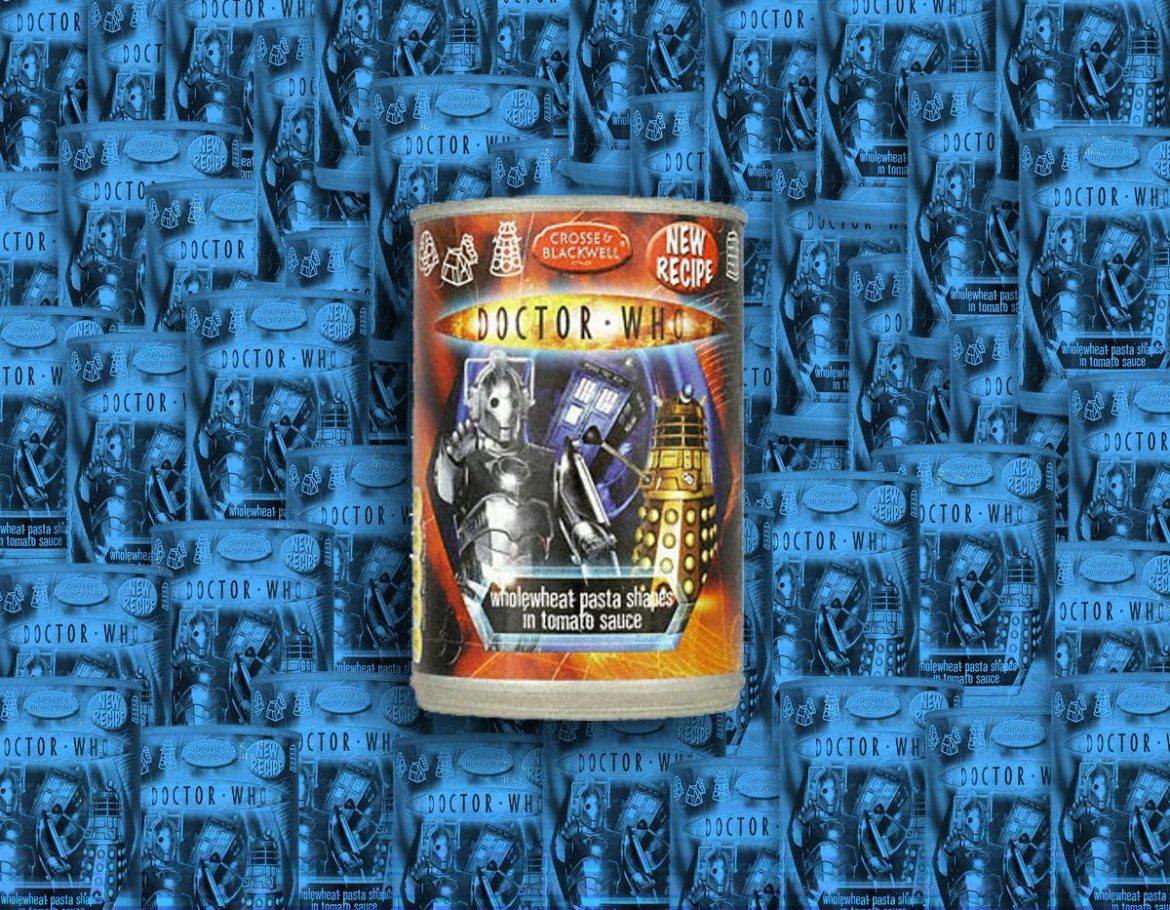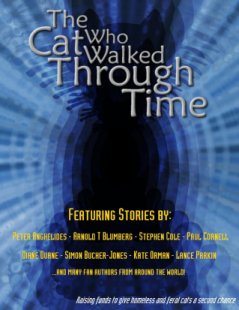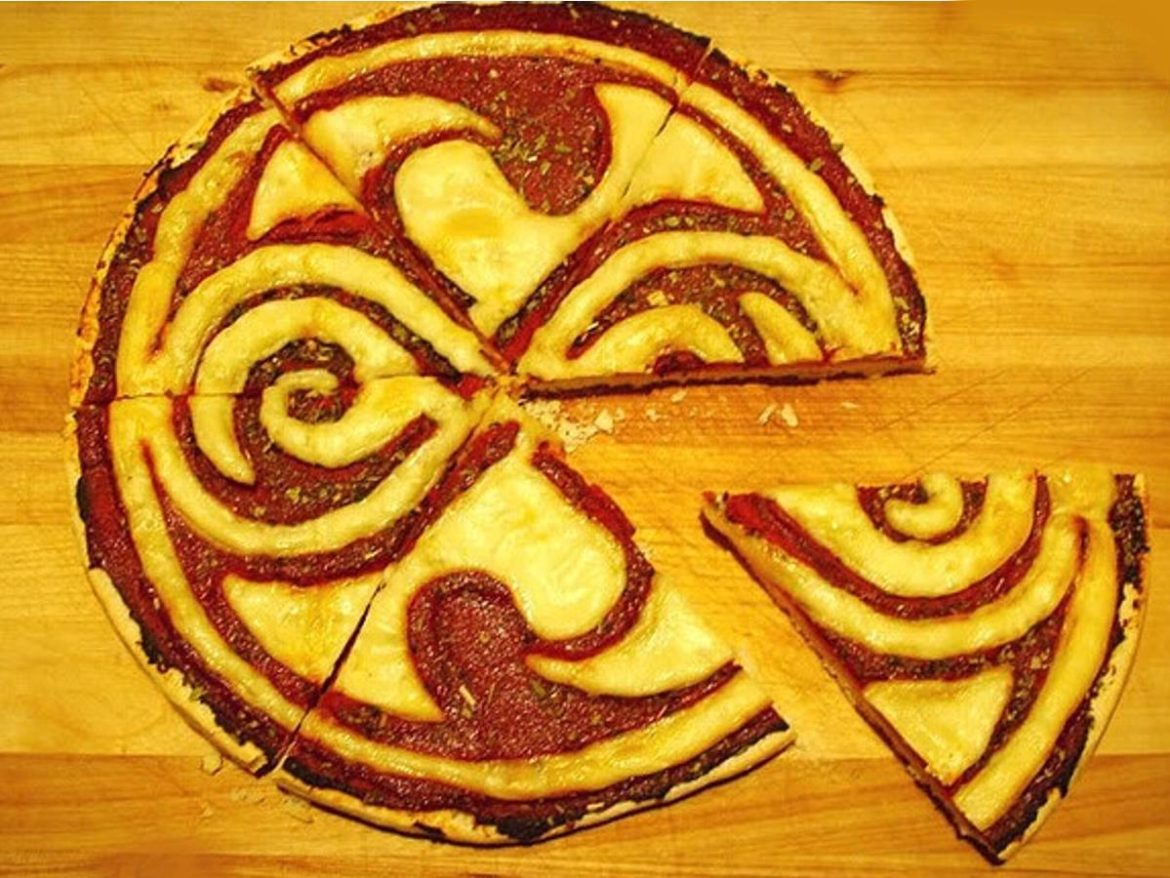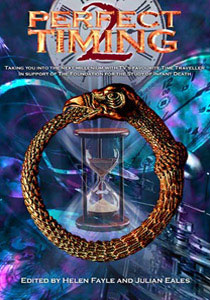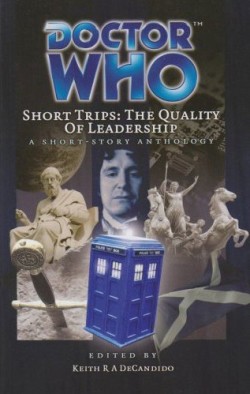“Tegan…!” the Doctor said, sounding infinitely weary, and very annoyed.
Tegan swallowed and turned toward him, prepared to take her medicine. The two of them stood in the TARDIS’s spacious brick-and-tile galley, and the Doctor, in shirtsleeves and long linen apron, was holding a cylindrical plastic object in his hands. The plastic was milky and webbed with many cracks.
“I seem to recall asking you not to put the bottom of the pasta machine in the dishwasher,” he said.
Tegan rolled her eyes, annoyed. “I wasn’t to know it was a sonic dishwasher, was I?”
The Doctor clenched his hands. The pasta-maker’s bowl simply fell apart and showered to the floor in a rain of clouded plastic fragments.
Tegan groaned softly and turned away.
“Now we’ll have to have the TARDIS extrude another one,” the Doctor said, resigned, “and you know how she can be about such things.”
“Erratic,” Tegan muttered.
“I wouldn’t talk if I were you,” said the Doctor. Then he caught himself, and looked abashed. “Sorry,” he said. “Look, it was a mistake. You won’t make it again. —Will you?”
“No,” Tegan said, trying to sound sulky, but failing. It was hard to be angry with the Doctor when he was in a conciliatory mood.
“That’s all right, then,” he said, and looked around him cheerfully again. “But we’re still out of pasta.”
“That’s no odds,” Tegan said, “we’re out of sauce too. Nyssa made pizza three times last week.”
“Well, we have all the sauce ingredients. But we’ll have to buy pasta out.”
“Earth?” Tegan said, sounding eager.
“Well,” said the Doctor, taking off his apron and pausing to wash his hands, “we could go to Balearis Magna…they make pasta there.”
“Is it any good?”
“Very,” said the Doctor. “If you’re a silicon-based life form. But we’re not…and even my sauce can’t do much for spaghetti made of asbestos. —Though I have to admit it’s certainly very hard to burn….”
They headed out of the galley together, through the long white corridors. “Is it really your sauce?” Tegan said.
“Well…you know how it is.” The Doctor grinned at her, a slightly conspiratorial look. “I got it from a professional liar I know…who got it from Wilma, who got it from Michelle, who got it from Michelle’s mother…who probably got it from Leonardo da Vinci. Just the sort of thing he’d throw together between painting classic pictures and inventing machines that were half a thousand years before their time. In fact, considering the tomato hadn’t reached Italy yet, it probably was Leonardo. I should stop back and ask him. And here we are.”
“Here” was a roundel-fronted door like a thousand others in the TARDIS. The Doctor pulled it open and waved the lights on.
“My word,” Tegan said. The room was about the size of the Sydney Opera House, and full of boxes, crates, cargo containers, bags, sacks and satchels, furniture, tools, knick-knacks, kickshaws, and assorted junk.
“Tertiary storage,” the Doctor said, threading his way among stacks of crates toward the far-away center of the room.
“If this is tertiary storage, what does main storage look like?” Tegan muttered. She stopped by a crate that had stenciled on it the words U.S. ARMY, TOP SECRET! DO NOT OPEN. A soft golden light was welling out of the cracks. “Doctor, what’s this?”
The Doctor glanced over at it, then went back to rummaging among some boxes. “Haven’t the slightest idea,” he said. “Something the Americans were worried about keeping safe. They gave it to MI 5, and a friend there gave it to me. And here it remains.” He straightened up, looking around. “I really ought to catalogue all this mess…it’s getting quite out of hand.”
“I had no idea you were such a packrat,” Tegan said, smiling wickedly at him.
“Oh well,” the Doctor said, stepping over some more crates to get at a bank of freestanding shelves. “It’s hard to stop, sometimes. You pick up things, and then you regenerate, and you get nostalgic about the old regeneration’s stuff, and you never really want to throw any of it away…” He started going through the boxes on the shelves.
“What exactly are we looking for?”
“Money,” the Doctor said.
“In here?”
“Where else, then?”
“Well…in a safe?”
“Why? Who on the TARDIS would steal it?”
“That’s true, but…”
“And generally I don’t need money,” the Doctor said, lifting down a box to get into the one under it. “The TARDIS is planned to run as a self-contained unit…but every now and then, disaster strikes.” He threw a small wicked look at Tegan.
She rolled her eyes and went over to help him. “Don’t Time Lords have any kind of credit facility?” she said, joking.
“Yes, as a matter of fact we do…”
“Why don’t you use yours, then?”
The Doctor coughed and cleared his throat, not because of the dust. “Well, you see, when I left Gallifrey…they, ah…”
“Canceled your credit line…”
“Mmph.”
“But surely you’ve made all that up with them!”
“Oh yes,” said the Doctor, looking slightly annoyed, “but you know how it is…the official communication has to go off to the credit agency, and they have to tidy up the records, and, you know, bureaucracy, red tape, it takes forever….”
Tegan sighed, then grinned. “You ought to get the credit card for renegade Time Lords, then,” she said.
The Doctor looked at her quizzically. “Sorry?”
“MasterCard!”
The Doctor groaned and briefly covered his face. “I’ve sometimes wondered what happens when you throw an unprotected human being out into the time vortex,” he said, and then went back to rummaging through the box at hand. “Never mind, we’ll find out later. —Here we are, then!”
“Money?” Tegan said, looking doubtfully at the dusty contents of the box. It was full of chips and blocks and lumps and nuggets and curls and weird-looking things that might have come out of the insides of alarm clocks.
The Doctor pulled out one example, a small hexagonal wafer of white plastic. “That’s a Balearic demi-thrang,” he said. “Too bad we can’t eat their pasta. Here, look for anything from Earth. Pounds, ideally: I want to go to Fortnum and Mason’s. Or the Food Hall at Harrods.”
Half an hour later Tegan was covered with enough dust to have made her a very rich woman on Rirhath B (where as the Doctor told her, soil for farming was excruciatingly scarce, and had itself become a commodity); but neither of them had so much as a real copper ha’penny to their names. There was precious metal enough—Tegan glanced with amusement at the Denebian “groat”, a three-pound block of platinum gorgeously engraved with pictures of things with tentacles, which the Doctor had burnished on his sleeve and put aside to use as a paperweight. But the smelter in the TARDIS’s machine shop was out of order at the moment, and the attempt to sell off alien coinages would be bound to attract unwanted attention on Earth.
“It’s hopeless,” Tegan said at last. “We could be at this for days, and it’s past dinnertime already. Let’s just go back to the Galley and scare up something else.”
“My stomach is set for spaghetti,” the Doctor said, standing up. “Come on, heart up, Tegan! There’s another way to get money.”
“Oh?”
“I’ll borrow some.” He got up, brushing off his own small fortune in dust. “There are lots of people on Earth who would lend me five pounds!”
“Always assuming you could ever find your way there again to pay them back,” Tegan said, not entirely under her breath, and laughing a little.
“Yes,” the Doctor said as they headed out of the room, and he threw her a look of amiable annoyance. “Let’s find Nyssa. Then, off to the console room.”
They found Nyssa in her room, creating life in a test-tube to pass the time. “Come on, we’re going to Earth,” said the Doctor. “Hallo there!” he said to the test tube, and hurried out of the room again.
“Going to Earth again?” Nyssa said to Tegan. “Or still?”
“We’ll find out.”
“Randomization?” Nyssa said, curious.
“No, not exactly. The TARDIS has telepathic circuitry, you know, and the isomorphic controls can be programmed to find what I want without my knowing exactly where it is.” The Doctor paused, peering at the controls, and made a couple of adjustments. “Within limits, of course: and it does use a lot of power, but I’m hungry! Ready?”
Nyssa and Tegan glanced at each other, then both grabbed hold of free areas of the console and held on tight, just in case.
“Now then old girl,” the Doctor said to the console, “take me where I can borrow some money!” And he hit the dematerialization switches.
The time rotor went up and down, the dimensioning circuitry made the usual wheezing and groaning. Then the rotor stopped.
“Well done!” the Doctor said, and opened the forward viewer.
They found themselves looking at a wide-porticoed building, all columns and impressive stairs: a bit old, but very splendid in the Victorian manner. Tegan guffawed. Nyssa looked expectant. The Doctor glanced down at the console with good-natured annoyance.
“Very funny,” he said. “But the Bank of England was not what I had in mind. Try it again…”
He hit the dematerialization switches again. The TARDIS’s screen blurred into the bright miasma of the time vortex, then steadied down as the rotor stopped. Tegan looked at interest at the screen: it showed the front of a block of flats in a small quiet street.
“Ealing,” the Doctor said with a delighted smile, and slipped around to pull up the door control. “Sara Jane’s house!” He ran out.
“Who’s Sara Jane?” Tegan said.
“You’ll like her,” the Doctor’s voice drifted to them from outside. “She’s just your type.”
But they never got a chance to find out if this was true, because Sara Jane turned out not to be at home: nor was someone called K9, and the Doctor looked a bit sad about it as he came back in. “Oh well,” he said. “There’s always Vicki…or Liz, or Lethbridge-Stewart…”
But the TARDIS appeared in rapid succession in front of a boys’ school in the country, and a manor house in Cambridgeshire, and a cottage in the Scilly Isles, and in every case the people they wanted to see were away from home. The Doctor was getting discouraged, and once Nyssa heard his stomach growl.
“I don’t understand it,” he said, as they came back to the TARDIS the fourth time. “Wild card option always works, it can’t be doing this…”
“This is the TARDIS we’re talking about,” Tegan said.
“No, wait,” Nyssa said, forestalling the Doctor’s testy reply. “Perhaps the syntax was off somehow. What was the command?”
“I said to her…thought to her, actually…I said, Take me where I can borrow some money…”
Nyssa smiled. “To where. Not to who.”
“Whom,” the Doctor said, but he flashed a grin at her. “That’s it, of course. Let me revise the command.” He looked down at the TARDIS console for a moment, and shut the doors.
“Here we go, then!”
The time rotor began its rise and fall, then quite abruptly stopped. “We must have been very close,” said the Doctor. He hit the door control and ran out, grabbing his hat off the stand in passing.
Tegan and Nyssa went after him—then paused as he had, looking around them in astonishment. It was evening in a narrow, cobbled street with many houses: the gaslights that lined the sidewalks bloomed softly through sulfur-smelling fog. A horse’s hoofs and the wheels of the cab it was drawing clattered on the uneven stone-setts far down at the street’s end.
The Doctor, with his hat in his hands, looked around him in growing delight. “Of course,” he said, “he’ll lend me money! Though all this may take some explaining….” And he loped off toward one of the house doors and yanked at its bell pull.
A slightly stout woman in her fifties answered the door, and Tegan was interested to see that she seemed not too surprised at the sight of a slight, fair man in cricketing clothes, and two (by Victorian standards) very oddly dressed women. “Good evening, madam,” said the Doctor, “and would you be so kind as to tell your employer that he has a visitor on a business of some mild urgency?”
“Certainly, sir,” said the woman. “Please come straight up.”
The three of them went up the stairs after the lady. Nyssa wrinkled her nose. “What’s that smell?” she whispered to Tegan.
“Pipe smoke.”
“Shag,” the Doctor said from ahead of them. “He did always prefer it, even though it’s strong enough to choke most people.”
A door opened in front of them. They stepped through it and found themselves in a small,crowded study, its several tables littered with books and chemical-set regalia, and many many newspapers. The gas was turned up bright: by it Tegan noticed with amusement that someone appeared to have spelled out the letters V.R. on a nearby wall, in bullet-holes. By the fire two fat overstuffed chairs and a horsehair sofa were drawn up, and from one of the chairs a man was rising. He was tall and lean and (to Tegan’s eye) formally dressed in waistcoat and high collar and stock: a pale man with deepset eyes and a prominent nose.
“How interesting,” he said in a beautiful light tenor voice. “We seem to have a duality of Doctors here tonight.”
The Doctor looked at the man in open astonishment. “My dear Holmes,” he said, “I haven’t been here since my last regeneration. How ever did you know me?”
Sherlock Holmes smiled. A second man got up from the other chair: he was shorter and wider, impressively moustached, and Tegan noticed that he favored his left side a bit as he stood. “We have left the ladies standing,” said Holmes. “Ladies, pray take a seat; the Doctor will introduce you. Watson, you have met this gentleman, though last time he looked rather different. It was during the sordid collusion between Moriarty and that terrible creature the Master. Doctor, do make yourself completely at home. Sherry?”
The amenities took them a few moments. “Perhaps the ladies will indulge me if I smoke?” said Holmes. “I thank you. So.” He relit the famous meerschaum and puffed on it for a moment. “—My deductions are never really that difficult,” he said, “but in your case I must stretch myself a little; for which I am glad of your company. Save for the trusty Watson here, this has been a tiresome day.” Holmes looked up, his eyes merry. “I see, Doctor, that you have been pursuing that most gentlemanly art, the wooing of the Kitchen Muse: that you have run out of some necessary ingredient, purveyed only on this planet: and that you are regrettably short of valuta… hence have come to an old colleague for assistance.”
“But how did you know him when he had regenerated?” Nyssa said.
“Ah, there is a matter requiring a little more nicety of deduction,” said Holmes. “Some few years ago I wrote a monograph on a new science, so new it was until then nameless; a study of the manner in which human beings move, and the ways in which one may infer from such movement much useful information about a person’s habits and provenance. I called the science ‘kinesics’, but it has since been sensationalized in the popular press as ‘body language’.”
“Vulgar,” Watson muttered.
“Though in its way, accurate,” said Holmes. “Now no two human beings move in quite the same way; but there are generalities that affect the whole species—subtleties of expression, of how one holds one’s body, and so forth. And when some years back I was visited by a tall curly-haired gentleman in an odd scarf, whose body language clearly indicated that he had been raised in no culture on the face of this planet, then the only possible conclusion was that he should have been raised off it.”
Holmes puffed reflectively for a moment. “Then,” he said, “tonight I have a visitor, who though entirely different from the first in face and somatype, still exhibits the extraordinary kinesics I have described. I leave aside the purely circumstantial evidence that he knows me; and that he comes accompanied by two young women, one of whom belongs to this planet but to a very different time, and one who like himself is of non-Terrene origin—though most certainly of a different culture, as the kinesics are again different from the Doctor’s.” He passed over Nyssa’s astonished look. “When such evidence presents itself, no other deduction is possible but that this man is the same as the gentleman with the scarf: miraculously altered, to be sure, but the same mind in a different body.”
“My dear Holmes,” said the Doctor, with a slow smile, “unlike me, you haven’t changed a bit.”
Holmes grinned, a look so like the Doctor’s more wicked smiles that Tegan almost broke out laughing at the sight of it. “Besides all that,” said the world’s greatest detective, “I say nothing at all of the absurd blue box that I watched appear groaning and wheezing out of nothing five minutes ago. My previous visitor gave me to understand that its shape was not taken by choice: and few conveyances with such a unique malfunction can be out and about.”
The Doctor grinned back.
“As to the money, you may be easy about it,” said Holmes.“The King of Bohemia’s representative was here only this afternoon to complete payment of a commission, and we are well off indeed. Perhaps you will all dine with us at Romano’s? You shall have your spaghettini there, Doctor: and afterward, the composer Tchaikovsky is conducting his own work at the Garden. —But at any rate, you are curious to know how I knew you were cooking.”
“Tchaikovsky!” the Doctor said softly.
Tegan’s mouth fell open. She shut it, and then said, “Mr. Holmes—”
“How did I know it was pasta the Doctor sought? Attend, madam, if you please. Notice first—” and Holmes pointed with his pipestem— “the faint band or mark on the sides of your companion’s neck. It becomes more noticeable toward the back, does it not? The Doctor has been wearing an apron recently: that is the mark of the neckband. Now he might have been wearing it to protect himself while cleaning…the dust of it is still upon his hair, as it is upon yours, madam—but traces of that dust are also under the areas which the apron would have covered. He therefore was in the kitchen first, and left it to begin his ransack when he found the vital ingredient missing. Also, that fleck of something reddish on his sleeve is yet another informer. I did not see it until just now, when the Doctor reached out to put his tea-cup down. It is in just such a spot as to have been splashed there by a boiling sauce-pot. Careless of you to let the sauce boil, Doctor. It should never go above the simmer.”
“I was looking for the bottom of the pasta machine,” said the Doctor.
“Which you found to be in some disrepair, to judge by this lady’s blush,” said Holmes, “and therefore you found it necessary to contemplate coming out of your remarkable conveyance to procure more. Whereupon you went looking for money—having some about, but having, as you told me last time, little use for it in most occasions—but you found none you could appropriately exchange. You then thought of friends on Earth…and I am honored you came to me.” And Holmes bowed a little where he sat.
“He might have been making chili,” Tegan said.
“But he was not,” said Holmes gently, “for first of all, the aroma of that dish’s spices are both distinctive and penetrating, and would hang about his clothes: and second, the Doctor is allergic to chili. And several gases…as he informed me while satisfying my understandable curiosity concerning the fascinating needs and oddities of an alien physiology.”
“Ketchup,” Tegan said.
“Madam, both walnut ketchup and its newfangled tomato-based variant dry a darker brown.” He smiled at her. “So your Doctor has his Watson as well. I am glad of it.”
He put his teacup down, and rose. “Ladies, Romano’s awaits us,” he said. “You will all want to change for dinner first, of course. But before dinner and the concert, we shall proceed to Fortnum and Mason’s, cause them to open the shop for us—for the management owes me a favor—and bear off in triumph the best pasta fresh from Rome. Which, Doctor, I would be honored if you would allow me to purchase for you.”
“Sir,” the Doctor said, “I would be delighted. Will you come down and have a quick tour of my craft while we change? I’ve made some improvements.”
“Indeed I was hoping you would offer,” said Holmes. “Come, Watson! We shall see wonders.
“—It’s your recipe, by the way,” Holmes added, as they headed down the stairs.
“I beg your pardon?”
“At Romano’s,” said Holmes. “I took the liberty of imparting it to the chef there. Every patron who tastes it proclaims it to be the finest salsa pomodoro alla Napolitana they have ever eaten.” And as they slipped one after another into the TARDIS, Holmes glanced humorously at the Doctor’s lapel.
“I think,” he said, “it has something to do with the celery.”
The Doctor smiled, and went off to look for his black tie and tails.
THE DOCTOR’S (FRIEND’S) (FRIEND WILMA’S)(FRIEND MICHELLE’S)(MOTHER’S) SUBJECTIVE SPAGHETTI SAUCE
Brown enough onions and garlic in a deep pan to suit your taste. (This is the subjective part.) Drain off any excess oil.
Add 2 24-ounce cans of tomato paste and two large sized (one-pound) cans of tomato puree.
Add to taste: grated parmesan, salt, pepper, oregano, and bay leaves. (Be sure to put the bay leaves in a little cheesecloth bag or teaball, and remove them when the sauce is done. IT IS DANGEROUS TO EAT BAY LEAVES, NO MATTER HOW WELL COOKED. They are frequently toxic, and at all times can cause intestinal perforation. A word to the wise!)
Cook the above over LOW heat for 4 to 4½ hours, stirring occasionally. DON’T LET IT BOIL!!! Ever.
And add, late in the process:
1/2 cup very, very finely chopped celery
If you like your sauce with meat (thus transforming it into one variant of ragù alla Bolognese):
Use 1 lb of lean ground beef per 6 people. First brown the meat separately and drain off the fat: then add one hour before the sauce will be done.
Make sure you stir the sauce off the bottom of the pot regularly. You don’t want it to burn…even if you’re on Balearis, and the spaghetti won’t.
Afterword:
Something that happens to most working writers over time is that they get asked to contribute writing to charitable ventures (as opposed to being asked to write things for free, a pernicious and annoying habit which the sane jobbing writer gives short shrift).
This happened to me a little more than ten years ago, when the people gathering together material for the charity anthology that would become Perfect Timing 2 contacted me and asked if I would consider donating a little something Whovian to the cause.
As it happened, I already had something. Years and years before — when dinosaurs walked the Earth and CompuServe was about all there was in the way of online life — I had been in the grip of a longstanding love affair that predates the one with my husband and was, in its own way, nearly as strong. Come to think of it, I’m still in the grip. I love the Doctor dearly.
Back then my fave was Five. It wasn’t that I didn’t like Tom Baker, the first Doctor I became acquainted with in the 70’s via the good offices of PBS (and our local affiliate, the splendid WNET). But for me there was something peculiarly attractive about Peter Davison’s portrayal of the Time Lord: something about the way he handled his personal ethos. These days it’s hard to be clear about the reasons in any more detail. In any case, eventually I did what I had done for a long time when I liked a character: I sat down and committed fanfic. The first short story, “The Effect of Dimensional Transcendence on Mozzarella Cheese” — which I wrote mostly as a joke — and later its sequel, wound up in the files area at HOM-29, the venerable SF and Fantasy Forums at CompuServe; and there they sat for ever so long, fading gently into obscurity.
So when the Perfect Timing people came to me, I thought, “Hmm: no need to write anything new: how about giving this an airing?” I submitted the story, they liked it, and it got published. So much for that.
A bit later, another anthology came along, and I fished out the second story, “A Dinner in Belgravia,” which scratched not only the Whovian itch, but another one of even longer standing — my deep love for the original Sherlock Holmes. (Not that I don’t have the writer-hots for the new incarnation, you understand. It’s impossible not to admire such a masterly reboot. But old loyalties die very very hard.)
And finally, to my great joy, the chance came to work in the Who universe under official auspices, and I jumped at it… but not without my own very muted back-reference. Readers of “Goths and Robbers” in Short Trips: the Quality of Leadership will note a certain concern with food: and indeed with pasta, which was a core issue in “Belgravia”. I think we have to assume that at that point, Five had run through the not inconsiderable amount of fettucine-or-whatever that five pounds Sterling would have bought in Holmes’s London, and needed to restock. Though personally I have to assume that the characteristic selfwilled swerve into the outfield of Time (if not Space) that the TARDIS takes during “Goths and Robbers” is about more than just concern over a Time Lord’s carb intake.
In any case, there’s no telling if or when I might ever again have anything to do with the Who universe in a professional capacity. Obviously I’d love to write for them. Who knows what future years will bring? …But if it ever happens — they’re going to have to work pretty hard to keep me from putting my nose into the TARDIS’s galley. — DD

